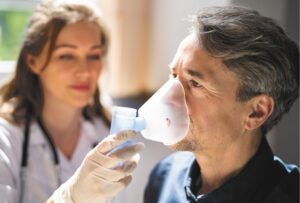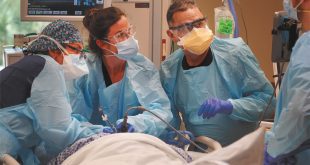By Ryan L. Baker, MD, FAAFP, and Tia Schlachter, PA, Family Medicine at Millennium Physician Group
 When cold and flu season arrives, another common virus often joins the mix, and it can be more serious than many realize.
When cold and flu season arrives, another common virus often joins the mix, and it can be more serious than many realize.
Respiratory syncytial virus, or RSV, affects the lungs and respiratory tract and is so widespread that nearly every child will have been infected by the age of two. But RSV doesn’t just affect babies – adults and older children can get it, too.
For most, symptoms resemble a common cold, but for infants, older adults, and those with underlying
conditions, RSV can lead to more severe illness requiring hospitalization. Understanding how RSV spreads, who’s at risk, and when to seek care can help protect yourself and your loved ones this RSV season.
What is RSV?
RSV is a respiratory virus that infects the nose, throat, and lungs. It’s highly contagious and spreads through droplets when an infected person coughs or sneezes, through direct contact, or by touching contaminated surfaces like doorknobs, toys, or countertops. The virus can survive for hours on hard surfaces, making it easy to pass from one person to another, especially in shared environments such as daycares, schools, or workplaces.
In most healthy adults and older children, RSV causes only mild, cold-like illness that typically clears on its own. However, in premature infants, older adults, and those with heart, lung, or immune system
conditions, the virus can lead to more severe
infections, such as bronchiolitis or pneumonia.
Recognizing RSV Symptoms
RSV symptoms often start mild and appear gradually rather than all at once. In adults and older children, common signs include:
• Congested or runny nose
• Dry cough
• Fatigue
• Headache
• Low-grade fever
• Sneezing
• Sore throat
In severe cases, RSV may spread to the lungs, causing more severe symptoms like:
• Wheezing or noisy breathing
• Rapid or labored breathing
• Persistent high fever
• Bluish or grayish lips or fingernails
Infants are particularly vulnerable because their immune systems are still developing and their smaller airways can become inflamed more easily.
Parents and caregivers should watch for warning signs such as:
• Fast, shallow, or labored breathing
• Chest muscles pulling inward with each breath
• Pauses in breathing
• Difficulty feeding or poor appetite
• Lethargy or unusual irritability
Seek immediate medical care if your child has trouble breathing, a high fever, or a bluish color around the lips or nail beds.
Possible RSV Complications
For some patients, RSV can lead to complications that require medical intervention, including:
• Hospitalization: Severe RSV can require a few days in the hospital for oxygen support or intravenous (IV) fluids if the patient cannot stay hydrated.
• Bronchiolitis and Pneumonia: RSV is the most common cause of these serious lung infections in infants.
• Ear Infections: The virus can sometimes spread to the middle ear, particularly in young children.
• Asthma: Some studies suggest a link between severe RSV infection early in life and a higher risk of developing asthma.
It is possible for RSV infections to recur, even within the same RSV season, although they are typically milder than the initial infection.
You Can Help Prevent RSV
We can all take practical steps to help prevent the spread of RSV:
• Wash hands often
• Cover coughs and sneezes
• Keep surfaces clean
• Avoid sharing cups or utensils
• Stop smoking or limit exposure to secondhand smoke
• Stay home when sick
RSV vs. the Common Cold
At first, RSV can look a lot like a regular cold. The difference lies in how long and how severe those symptoms become. While a typical cold clears up in about a week, RSV can linger for two weeks or longer.
RSV symptoms also tend to be more intense, often involving wheezing or fevers around 100 to 102 degrees Fahrenheit or higher. Because RSV can cause inflammation deep in the lungs, complications such as bronchiolitis or pneumonia can occur in higher-risk patients, especially infants and older adults.
For most healthy adults, supportive care such as rest, fluids, and over-the-counter fever reducers is enough. But if symptoms worsen, if a fever reaches 102 degrees or higher, breathing becomes difficult, or if your child is under 12 months old, it’s time to contact your healthcare provider.
Count on Millennium Physician Group
If you’re concerned about RSV or any respiratory symptoms, Millennium Physician Group is here to help. Our comprehensive care team can evaluate your symptoms and coordinate care when more specialized treatment is needed. Same-day and telehealth appointments are available, so you can get the care you need without delay. We’re dedicated to helping you breathe easier and stay well all year round.
Attention Medicare-Eligible Patients: Medicare’s Open Enrollment Period runs from October 15 through December 7. This is the time each year to review your coverage and make any changes to your Medicare Advantage or Part D prescription drug plan. You can learn more at www.medicare.gov or by calling 1-800-MEDICARE.
2299 9th Ave N, Suite 1A
St. Petersburg, FL 33713
727.655.9854 | MillenniumPhysician.com
This information is intended for informational purposes only and is not intended to be a substitute for professional medical guidance, diagnosis or treatment. No physician-patient relationship is created by this or its use.
 Central Florida Health and Wellness Magazine Health and Wellness Articles of the Villages
Central Florida Health and Wellness Magazine Health and Wellness Articles of the Villages



